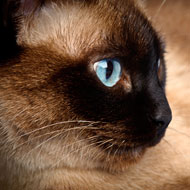"Questionable results" yielded by feline diabetes research

Dr Niessen says human-style clinical trials are needed to compare the effectiveness of different treatments.
Past research on feline diabetes lacks collaboration and is based on low-level evidence, leading to "questionable results". This is according to a systematic review of research papers carried out by the Royal Veterinary College (RVC).
"Current research into the condition is sporadic, lacking a long-term vision and not collaborative," says Dr Stijn Niessan, who launched the RVC's Feline Diabetic Remission Clinic (FDRC) with his team in 2013.
Dr Niessan believes human-style clinical trials are the best method to compare remission rates with different types of insulin.
"The only way to improve the quality of research and its results is to design and implement well-structured clinical trials, similar to those used by pharmaceutical companies in human medicine.
“This sort of trial can have a powerful impact on a treatment and how it is used. They can more accurately gauge the pros and cons of specific diabetic treatments for cats, helping us pinpoint troublesome side effects as well as identifying the benefits."
Researchers say treatment recommendations are based on past research with sample sizes of as few as eight cat and the largest samples contained 50 to 60 cats. Statistical tests carried out by the FDRC team suggest that a minimum of 80 to 90 cats are required to accurately compare different treatments.
Dr Niessan says more collaboration is needed both nationally and internationally to address the inconsistencies in the treatment of feline diabetes.
"A pet owner can, in theory, go to two different vets and get two very different treatments for the same condition," he explains. "The owner could then go online and find a third way. These treatments aren’t necessarily wrong, it is just one vet may have been trained in one methodology and another in a different way.
"This is why a collaborative approach is so important, so we can end these inconsistencies and can get closer to the actual truth about which way best to treat our feline friends."



 The RCVS has announced a new version of its 1CPD mobile app, with enhanced features for veterinary surgeons and veterinary nurses to record their continuing professional development.
The RCVS has announced a new version of its 1CPD mobile app, with enhanced features for veterinary surgeons and veterinary nurses to record their continuing professional development.